
Details
-
1 Courses
Karen Sheffler
MS, CCC-SLP, BCS-S
Karen Sheffler has more than 23 years of experience as a medical speech-language pathologist, specializing in dysphagia since 1995, when she graduated from the University of Wisconsin-Madison. She has had her board certification as a swallowing specialist (BCS-S) since 2012.
In 2014, she started SwallowStudy.com, which is a dysphagia resource for people with difficulty swallowing and professionals. Karen has worked in acute care, rehabilitation centers, skilled nursing facilities, and home healthcare. She currently works at Beth Israel Deaconess Medical Center in Boston and owns her own dysphagia consulting business. She crafts lectures/webinars, which have had a global reach. She actively promotes dysphagia and dysphagia awareness on many social media platforms. She performs peer reviews for companies and organizations. Karen has provided dysphagia expert services to companies for years and expert witness services for law firms since 2016.
Believing in constant continuing education, she has been awarded the ASHA Award for Continuing Education seven times. She was awarded the Hormel Health Hero Award in 2019. She is a member of ASHA’s Special Interest Group 13, the National Foundation of Swallowing Disorders (NFOSD), and the Dysphagia Research Society (DRS) where she was a member of the Website, Communications, and Public Relations Committee until April 2020. Currently, she cochairs the Public Relations & Communications Committee for the American Board of Swallowing and Swallowing Disorders (ABSSD). She has been promoting IDDSI since 2014; she became an IDDSI champion in 2016, and now she is a member of the US & Territories IDDSI Expert Reference Group (USTIRG) to assist with national adoption of the standardized dysphagia diet framework.
Learn from Karen Sheffler and 980+ other industry-leading experts.
